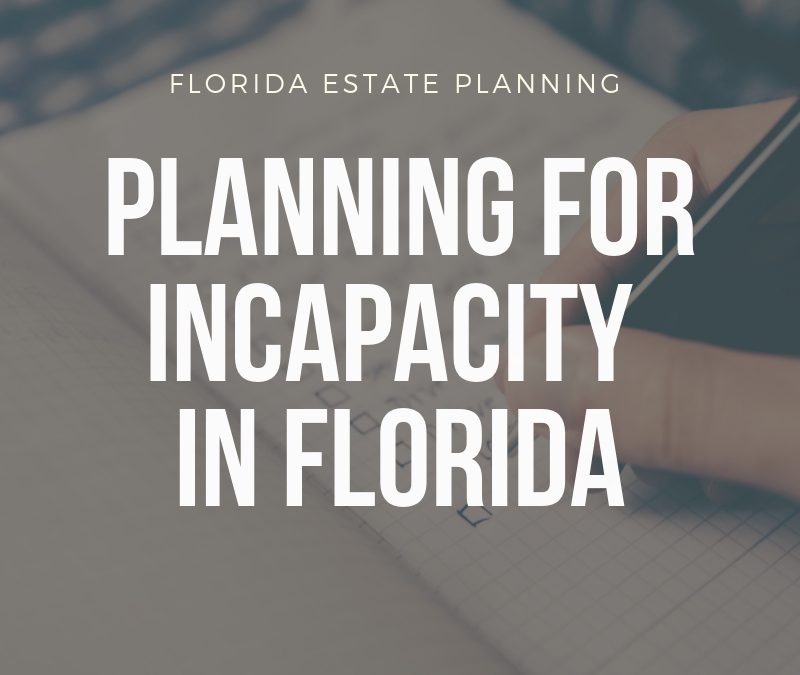Most prudent individuals have a plan for how they want their property to be distributed amongst their heirs when they pass away. But, any plan that they put in place can go to waste if, by accident or illness, they become incapacitated or otherwise unable to manage their own affairs while they are still alive.
For example, if you are injured in a car accident and become unconscious for a period of time, your assets could become substantially depleted if they are not managed during that period. In addition, your loved ones could be left without money to live on and pay for your medical care if they are unable to access all or most of your family’s savings during your period of incapacity. Proper estate planning can help you avoid these unpleasant scenarios.
Incapacity and Your Financial Affairs in Florida
There are essentially three main ways you can plan to have your property and finances taken care of for you in the event that you become incapacitated in Florida:
- Joint Ownership
- A Durable Power of attorney
- A Living Trust
Joint Ownership
Joint ownership basically, allows the joint owner to have the same access to property and other assets that you have. For example, if you and your spouse have a joint checking account and one of you can’t make withdrawals from it to pay bills, the other spouse will be fully authorized to do so.
A Durable Power of attorney
A Florida durable power of attorney lets you designate an agent (usually a family member or other trusted individual) to make specified financial decisions for you when you are unable to do so for yourself. The scope of the powers you grant to your agent can be very broad or very limited, depending on the language in the document itself.
A Living Trust
Use of a living trust (also referred to as a revocable living trust) is a very common estate planning strategy in Florida. It allows you to designate a successor trustee to take over management of property held in trust when you, the original trustee, are no longer capable of doing so. Trusts are very flexible and can also be used to accomplish a variety of other estate planning goals, including, but not limited to, avoiding probate and planning for the future needs of a child with disabilities.
Incapacity and Healthcare In Florida
When we talk about planning for incapacity, not only do we need to consider who and how your assets and finances will be managed, but also what health care decisions should be made for you and by whom. There are essentially three main estate planning tools commonly used to address incapacity as it regards your health care in Florida:
- A Living Will
- A Durable Power of Attorney for Health Care
- A DNR (Do Not Resuscitate Order)
A Durable Power of Attorney for Health Care
A durable power of attorney for health care (also known in Florida as a health care advance directive) will allow you to designate a family member or other trusted individual to make health care decisions for you. A health care advance directive gives your agent broad discretionary power to make medical decisions for you when you are unable to do so..
A Living Will
A living will, often part of your health care advance directive, is a document that lists the medical treatment that you would or would not want to receive under particular circumstances. For example, it can make it clear to your family and doctors that you don’t want life support if you are in a persistent vegetative state. A living will puts your instruction in writing to avoid disagreements between family members over what you would want if you were able to decide for yourself.
A DNR
A Do Not Resuscitate Order (DNR) directs health care workers to withhold life-prolonging or resuscitative measures and are very common when planning for end-of-life care involving hospice situations, terminal illness, etc.
HIPAA Release
Another estate planning tool you should think about having in place when planning for incapacity is a HIPAA release. The Health Insurance Portability and Accountability Act (HIPAA) restricts what medical information a doctor can release about a patient. Without a HIPAA release, when you or a family member is injured or becomes incapacitated, the rest of your family may have very limited access to information regarding your medical condition, treatment, and prognosis and may even have trouble simply finding out what hospital you have been taken to in emergency situations.
Contact an Experienced
Florida Estate Planning Attorney
For more information regarding planning for incapacity in Florida and other estate planning matters, contact Lynchard & Seely, PLLC, either online or by calling 1-850-936-9385, to arrange a consultation with an experienced Florida estate planning attorney.
Want Help With Your Estate Plan?
Click Below to Schedule a FREE Initial Consultation!
Lynchard & Seely – COVID-19 Update
We want to update you on the steps we are taking to ensure we can continue to meet your legal needs in a secure and reliable manner. This year marks our firm’s 20th year in Navarre, and our team remains fully operational and here to support you and our community...

3 Florida Estate Planning Documents You Need Right Now
Three, fairly simple Florida estate planning documents is all you need. While, other things can help more, these will get you by in a pinch.

Estate Planning For Small Business Owners
Estate Planning for Small Business Owners – You have to think about more when estate planning if you have a business.
Want Help With Your Estate Plan?
Click Below to Schedule a FREE Initial Consultation!

